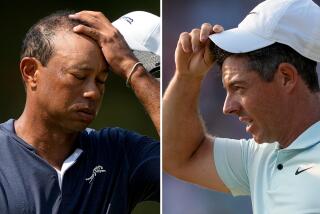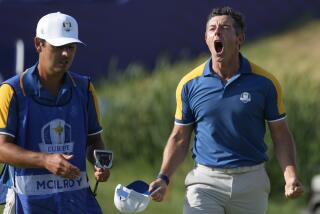IT’S SAD BUT TROON : Resurgent Europeans Are Favored to Defeat Yanks in British Open
- Share via
TROON, Scotland — The 118th British Open golf championship doesn’t begin until Thursday, but American pros have been on the defensive since their arrival earlier in the week.
They are constantly reminded that a U.S. golfer hasn’t won the British Open since Tom Watson won in 1983 and that the United States has lost consecutive Ryder Cup matches to the European team in the bi-annual event.
This is a reversal from the 1960s and ‘70s, when the Americans dominated the event. Moreover, in the 27 Ryder Cup events the United States has won 21 compared to five for Europe (there was one tie). A Great Britain-Ireland team was expanded in 1979 to include all European tour members.
The British Open waned in world-wide appeal at one time because of low purses and the lack of famous players until Arnold Palmer revived its waning prestige by participating.
It now attracts the best players in the world, including Britain’s Nick Faldo and Sandy Lyle; Spain’s Seve Ballesteros, Australia’s Greg Norman, West Germany’s Bernhard Langer, Ian Woosnam of Wales and others.
There is a spirit of competition between the American and European golfers intensified by the Masters victories of Lyle and Faldo in 1988 and 1989.
Tony Jacklin, the captain of the European Ryder Cup team, fueled the rivalry when he said last year that the top Europeans players are better than their American counterparts and that a European player would surely win the British Open.
All of which brings us to this year’s tournament. Odds posted by British bookies are 5-2 that an American won’t win here this year.
Tom Kite is aware of the odds if for no other reason than he was reminded of them by the British press.
“I think there is a little over-reaction on the part of the fans and maybe the media over here as to what has happened the last few years,” Kite said.
He acknowledges that Europeans have some of the best players in the world, adding, however, that the last three Ryder Cup matches have been very close, coming down to the last hole on the last day.
“There is tremendous pride over here right now and rightfully so,” Kite said. “But don’t downgrade the American players. We aren’t dogs, and we can play a little bit, too.”
Watson, who has won five British Opens, including a victory here in 1982, isn’t bothered by the odds.
“It’s a good bet,” he said. “Considering the way the championship has gone in the last five years, that is a reasonable judgment on the part of the bookies.”
Kite says the caliber of play by European golfers began to improve in the late ‘70s and early ‘80s, when they played on the PGA Tour.
“They came over and saw us when we were not always at our best, saw (Jack) Nicklaus and Watson winning, but also missing cuts, if not very often. All of a sudden it instilled confidence in the European players,” he said. “They saw that we were not perfect and they were not far behind. They kept improving on their games.”
Said Curtis Strange, the two-time defending U.S. Open champion, of the rivalry with the Europeans:
“I don’t think about it too much. I try to look after Curtis Strange . . . there’s a lot of good players from America over here who have a chance to win and I have to beat them and a lot of good European players, too.
“I’m aware of the fact, though, that there is a growing sense of competitive spirit between the Europeans and Americans, but there’s nothing wrong with that. It has grown out of the Ryder Cup.
“But I don’t think it (rivalry) comes into effect until the Ryder Cup. If I come down to the last hole this week playing against someone, I don’t give a damn where he’s from. I want to beat him. He’s just another player standing between me and the trophy.
“You’re out there playing the field, not individuals from different countries.”
As for the odds against an American winning, Strange said: “On strictly numbers, the odds are against us. I won’t disagree with the odds, but that doesn’t mean we (Americans) can’t win.”
There are 41 American golfers in the field of 156.
Aside from the U.S.-European rivalry, the weather is another much-discussed topic.
It hasn’t rained as it often does at this time of the year. The wind isn’t howling off the Firth of Clyde, the bay that parallels part of the course. The rough isn’t as restrictive because of the lack of rain. And the temperature has been in the mid-70s.
“I like the course,” Strange said. “It certainly is a lot different than what we’ve been playing at home with rain for six weeks or more. It’s been more like target golf. When we’ve hit the ball, it has stuck on the fairways and greens.”
“Here, the fairways are very firm. But I don’t think it (weather) will stay like this. Wind will eliminate some of the players. If you have tougher conditions, the better players will win. I’d like to see some wind, but I don’t want to see it knocking us down, either.”
Said Ballesteros: “Wind will be a big factor,” he said. “If it blows, it will be very tough. If it stays calm, scores will be quite low. I hope it will blow.”
With the hard fairways on the seaside course, players will have to play more bump-and-run shots into the greens rather than the high-trajectory iron shots favored on the American tour. “The game is 40% harder when you have to bump and run the ball, even from 90 yards,” Norman said.
Norman, one of the longest hitters, said the first two holes, par-fours measuring 364 and 391 yards, respectively, can be reached from the tee.
“I hit a six-iron into the the par-five fourth hole (557 yards) after a drive of 400 yards,” he said of a practice round. “You can get an extra 120 yards if your ball hits on a downslope.”
As for the rivalry between the American and European golfers, Norman, an Australian, is strictly neutral. The Ryder Cup matches will be held Sept. 22-24 at The Belfry in Sutton Coldfield, England.
“I don’t have a rooting interest. I have friends on both sides,” Norman said. “In fact, I won’t even watch it (on television).”
More to Read
Go beyond the scoreboard
Get the latest on L.A.'s teams in the daily Sports Report newsletter.
You may occasionally receive promotional content from the Los Angeles Times.










